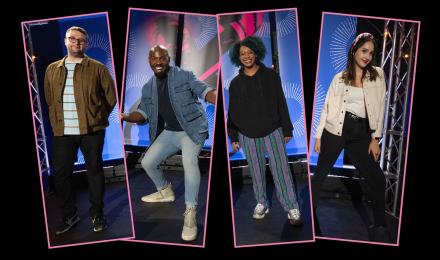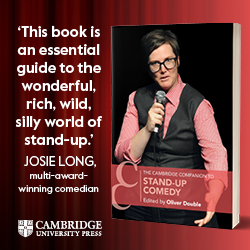
Darren Harriott is the host of the latest edition of BBC Three's Stand Up For Live Comedy. It is available on iPlayer from Friday, October 9 and on BBC1 on Monday, October 12 at 10.45pm too. It was recorded at Nortons of Digbeth in Birmingham. The guests are Bella Hull, Kemah Bob and Chris Washington.
Why do you feel Stand Up For Live Comedy is an important show for right now?
It’s fun and it’s very fresh, and I think people always look at stand-up comedians as being the ones who tell it like it is. People want to hear somebody say something that they can relate to and it doesn’t have to be about the past six months or whatever, it can just be little things in life - little quirks where maybe people thought they were alone, then the comedian goes up on stage, talks about it and makes it really funny. Music is amazing but I don’t feel you can relate to it the same way you can to comedy just because yeah, they’re being honest but they’ve got to make it rhyme and all that. With comedy you get that raw honesty and sometimes you go on stage and talk about something that happened to you maybe just ten minutes ago. That’s definitely needed right now and obviously things weren’t that funny over the past few months, especially for stand-up comedians who haven’t been doing YouTube clips and that kind of stuff. They’ve been waiting for their moment to come back and I think a show like this is important in giving them that.
How have you been keeping yourself busy over these past few months yourself?
Mainly just eating and gaining weight. What else was there to do? My Uber Eats delivery driver was definitely a key worker for me, I’d say. I had a few projects to work on but I also watched a lot of films. I watched a lot of Disney films I’d never seen before. I went through 55 of ’em. People thought I was losing my mind. They were like ‘Why are you watching Pinocchio at 4pm on a Monday?’ and my response was ‘Because I’ve not seen it’.
Have you mastered any new skills during the pandemic?
I learned how to make cocktails but that might just be a nice way of saying ‘alcoholism’. I got into cocktail making and I want to try baking. Now that the baking/banana bread hype has died down I’m gonna give it a go for the first time. I’ve mastered Zoom, I think, and Zoom backgrounds. I don’t know who the heads of Skype are but they must have jumped off a building. Skype was the video chat thing everyone used, then Zoom sneakily came along and now it’s valued at several billion. I’d be so upset if I was the boss of Skype.
You recorded your episode of Stand Up For Live Comedy at Birmingham's Nortons of Digbeth. Does the venue have any significance for you as a performer or comedy-goer?
I haven’t performed at Nortons before but I used to work at the music venues in Digbeth as a bouncer and on the same road there’s a mural of, like, 20 future Birmingham stars on the side of one of the buildings where there’s a big picture of my face. Digbeth has always been a great place for gigs, comedy and creativity in Birmingham. There’s a lot of art and textiles stuff going on there, you’ve got the bars and the clubs, lots of vintage shops, so when people visit Birmingham I’d say they should definitely have a look around the area. I know the Bullring is the star attraction but personally I think New Street might be even better than the Bullring - ooh, controversial! - and Digbeth is a great area with loads happening.
Was this your first time back in front of a live audience?
I recorded it on a Thursday and the Monday of that week was my first gig in six months. I did two gigs a night at a place called Top Secret, just to get the feel back, then I did Stand Up For Live Comedy. That first night back on stage was a bit rusty and I felt a little unsure, but luckily I’ve been doing this for a long time and you do get that muscle back. There were definitely slight nerves at that first gig but it didn’t take me long to get back into it. I’m now writing new material and just taking my time with it, because there’s no rush at the moment. It’s not like big tours are going to be happening any time soon.
What is it like in venues and backstage now in terms of precautionary measures?
There was hand sanitiser everywhere and you did your own make-up if you needed it. I’m a dab hand at taking the shine off and putting a bit of powder on. [Laughs] Come on Darren, take care of yourself! People are maintaining a social distance backstage and there are no after-parties or anything like that. Then in the audience, at Tope Secret at least, there was plastic in between each row, so if you were in the last row it was a little bit blurry because you’re looking through, like, seven sheets of plastic. [Laughs] It was very surreal but it worked really well. You realise people have a real hunger to watch comedy. I thought it was maybe just comedians who had a real hunger to get back on stage, but you’ve had people going to gigs in car parks where they had to stay in their cars and because the performers can’t hear the laughter they were beeping their horns. The audience is so into it that they’re willing to go through all of that and, other than the plastic screens, all the gigs I’ve been doing feel just like normal gigs.
Have you done any car park performances yourself?
No, I said no to them. The audience felt just too far away for me - like, 100 feet away, in their cars. And that was in June and July when everything was a bit more uncertain. It wasn’t for me, man.
Your co-comedians on the show are Bella Hull, Kemah Bob and Chris Washington. What do they each bring to the mix?
Chris is great. I’ve seen him before and he’s got that Northern/Manchester-type material. Bella was new to me, a new act, but she did really well. Obviously Chris has been going a little while now and he’s slowly working his way up. It was nice to have him headline and he was brilliant, then it was nice to have someone like Bella who is relatively new. She’d been down in the dumps over lockdown because her career was halted. It was the same for everybody else, of course, but she was just in this flat share not really knowing what was going to happen, then the next thing you know ‘Bam!’ - she’s filming a TV show and doing stand-up again. Kemah was in a similar position and she was really happy to be on stage. If someone had said to me when I was starting out ‘This is your first TV appearance after six months in lockdown’ I’d be really panicky, but Bella and Kemah dealt with it fine. They handled it much better than I would have done.
How does what’s been happening around the world in general and the UK in particular play into your comedy?
I address the stuff that really matters to me. I’m not big on Brexit because, like with Trump, it’s hard to keep up with it all. There are comics who do do that and I spare a thought for them because I wouldn’t wanna be the guy talking about Brexit for an hour. With the coronavirus, it’s hard not to do references to it because it’s not just the virus, it’s lockdown and what you went through and now coming out of it. I address other things that happened over the summer like Black Lives Matter, the great statue wars of 2020 and that sort of stuff. You just have to be mindful. Even though you may want to talk about it, are people fatigued with hearing about the virus and lockdown, what the government are saying and things like that?
When it comes to making people laugh, do you have boundaries you won’t cross?
No, I don’t, not if something’s funny, I know it will work and that it’s coming from a good place, even though it doesn’t always have to come from a good place. I don’t believe in punching up or punching down, I just believe you should be punching. Someone’s always on the lower end of a joke anyway. It doesn’t matter who you’re talking about, someone is always the laughing stock. The reason I don’t like punching up or punching down is because there are, say, a lot of white middle class comics who would never mention a black person in their act because they feel like that’s punching down, and that’s offensive to me as a black person as I don’t see myself as being below anyone. We’re all adults, we’re all human and of course there are people who should be protected, but it’s a classic case of ‘Would you say it if they were there?’ If I had a joke about gosh, I don’t know… a Sikh man. Let’s say I think it’s an innocent joke but if it was a room full of Sikhs would I do that joke? If the answer is no then I should never do that joke again because I clearly feel there’s a problem with it.
Why do you feel comedy is such a vital part of British culture?
Britain has some of the most pioneering comedians and comedy shows ever. We’re very understated with a lot of our stuff. If you look at Saturday Night Live in America, for example, it’s a big, brash show. We don’t really do that sort of stuff over here. Look at the UK version of The Office? How much more understated a show do you get than that? I think the British sense of humour is one of the best in the world because we can acknowledge that you don’t always have to be happy or upbeat. You don’t always have to be like ‘Hey, how’s everybody doing today?’ We have that very British saying of ‘It’s a bit s*** really, innit?’ That’s just how we are and when you have that mentality in your comedy it allows you to go down avenues that aren’t always upbeat and happy.
Interview supplied by publicists.



